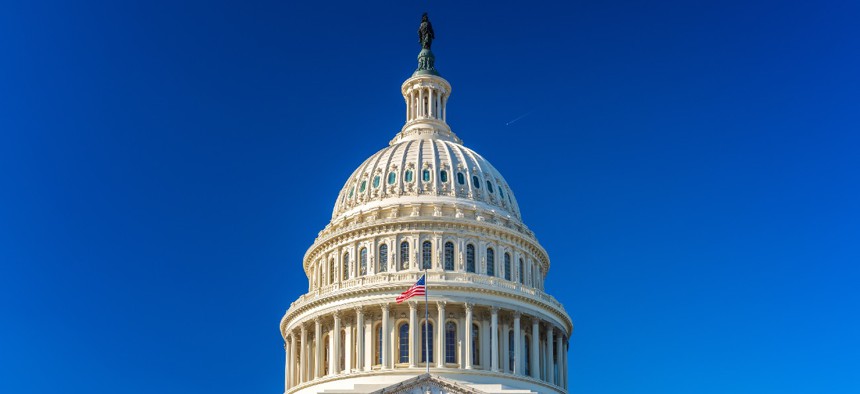
sborisov / iStock
Deadline is Approaching to Repeal Trump Rules Using ‘Obscure’ Law
Lawmakers can use the Congressional Review Act to eliminate certain Trump-era regulations.
The deadline to undo certain last-minute or “midnight” regulations by the Trump administration using a 25-year old law is fast approaching, but there hasn’t been any action so far.
Under the Congressional Review Act, members of Congress have until roughly April 4 to introduce a resolution to undo specific regulations issued between August 21, 2020, and January 3, 2021. Separately, the Senate has until sometime in mid-May to use special fast-track procedures that allow for a simple majority to pass a resolution. The specific deadlines are contingent upon how often Congress meets from now until then.
Between February 16, 2017, and May 17, 2017, then-President Trump signed 14 resolutions to undo Obama-era regulations and signed two more later on, according to the Regulatory Studies Center at The George Washington University. This was when Republicans controlled both chambers of Congress, as the Democrats do now. The law, enacted in 1996, was only used successfully one time before 2017.
“Congress faces competing pressures with respect to the [Congressional Review Act],” said Susan Dudley, director of the Regulatory Studies Center at The George Washington University. “On the one hand, a joint vote can quickly overturn Trump regulations with a resolution of disapproval, but on the other hand, that would take time away from other business. Also, the [Congressional Review Act] is a blunt tool and disapproval could not only eliminate the Trump regulation, but constrain how the Biden administration approaches those issues.”
Meghan Claire Hammond, associate at the law firm Pillsbury Winthrop Shaw Pittman LLP, said the lack of action during the start of the Biden administration is “likely because—despite not being subject to filibuster—each joint resolution under the [Congressional Review Act] may require 10-hours of Senate floor time, which has been a very precious commodity for the president during the early days of his term, given the impeachment hearings, Cabinet confirmations, and passage of the American Rescue Plan.”
Another consideration is that the act requires agencies to get authority from Congress if they want to issue a regulation that is “substantially the same” as one repealed under the act, she added. “The provision is not clearly defined, and Democrats may be skittish about overturning a rule on a broad issue and requiring congressional consent for a rule on that same topic later in the administration.”
Amit Narang, regulatory policy advocate at Public Citizen, said the Biden administration has already been “aggressive and effective in reversing last minute regulatory rollbacks from the Trump administration and setting the foundation for Biden's regulatory agenda,” through the memo issued on day one freezing rules that hadn’t taken effect yet.
“Working with Congress to fix the most egregious damage from the Trump administration by using the [Congressional Review Act] is the natural next step,” he said.
The Coalition for Sensible Safeguards, whose executive committee Public Citizen co-chairs, compiled a list of “notable” regulations that could be subject to repeal, which involve the environment, immigration, transportation and more.
Despite no formal resolutions introduced yet, a lawmaker proposed a Congressional Review Act-related action on Friday.
Rep. Jamie Raskin, D-Md., chairman of the House Oversight and Reform Subcommittee on Civil Rights and Civil Liberties, asked the Office of Management and Budget on Friday to “freeze and repeal” last-minute regulations from the Trump administration that “violate the rights of federal prisoners, LGBTQ+ individuals, and asylum-seekers and do not comply with the requirements of the [Congressional Review Act].” This was following a report Public Citizen issued earlier this month that found the Biden administration could “freeze” at least 25 more regulations from Trump due to errors by officials in issuing them.
These regulations “can still be challenged using the [Congressional Review Act], but they are on a separate ‘clock’ from the midnight rules that were carried over from last Congress,” Narang previously told Government Executive. “Any rules that were frozen but not yet repealed by the Biden administration can be challenged under the [review act]. It's not an either/or situation.”
There was much talk about using the act after the Democrats took back the Senate after gaining two seats from the special elections in Georgia on January 5. Several top lawmakers told Politico last week that they are still considering using it, but haven’t made any decisions yet.
Deregulation was a cornerstone policy of the Trump administration to tackle immigration, job growth, the coronavirus pandemic and other policy priorities, despite the fact that many regulatory rollbacks did not hold up in court and the administration fell short of its goals for cutting two rules for every new one issued (as mandated by a January 2017 executive order) in fiscal 2019 and 2020.
Daniel Farber, a law professor at the University of California, Berkeley, wrote in The Conversation in January that there are risks with Democrats using the “obscure” review act. “Maybe if the Congressional Review Act is now turned against Republican policies after being turned against Democratic policies, we may start to have a healthy debate on whether this mechanism for congressional oversight is worth keeping,” he said.
Besides the freeze memo and Congressional Review Act, there are other ways the Biden administration is working to undo the Trump administration’s deregulatory policies.
For example, the Health and Human Services Department is going to delay the effective date of a final rule that would require certain regulations to be reviewed every 10 years to see if they’re still needed, due to a lawsuit challenging it. Trump’s HHS said this was part of an “unprecedented” push for regulatory review.
Matt Kent, regulatory policy associate at Public Citizen, tweeted it was a “big relief to see this addressed.”







